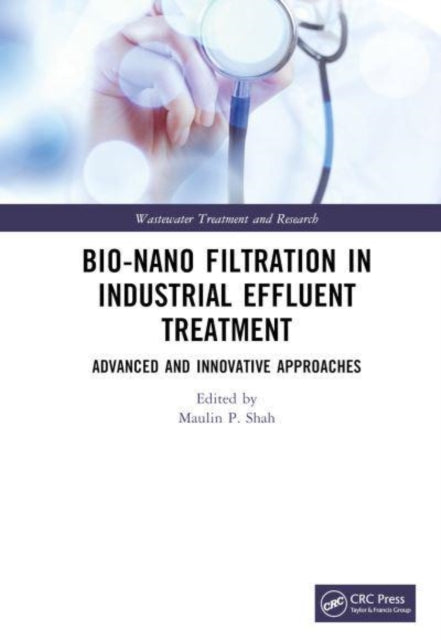Shulph Ink
Bio-Nano Filtration in Industrial Effluent Treatment: Advanced and Innovative Approaches
Bio-Nano Filtration in Industrial Effluent Treatment: Advanced and Innovative Approaches
YOU SAVE £6.00
- Condition: Brand new
- UK Delivery times: Usually arrives within 2 - 3 working days
- UK Shipping: Fee starts at £2.39. Subject to product weight & dimension
Bulk ordering. Want 15 or more copies? Get a personalised quote and bigger discounts. Learn more about bulk orders.
Couldn't load pickup availability
- More about Bio-Nano Filtration in Industrial Effluent Treatment: Advanced and Innovative Approaches
Bio nanofiltration is a process that uses tiny filters made of biological materials to remove pollutants from water. It is a promising technology for treating wastewater, as it can be more efficient and cost-effective than traditional methods.
Bio nanofiltration is a process that uses tiny filters made of biological materials to remove pollutants from water. It is a promising technology for treating wastewater, as it can be more efficient and cost-effective than traditional methods. Modeling of bio nanofiltration is used to predict the performance of the process and optimize its design. Designing of bio nanofillers is used to create materials with specific properties that are suitable for use in bio nanofiltration.
Format: Hardback
Length: 216 pages
Publication date: 29 March 2023
Publisher: Taylor & Francis Ltd
The microbial ecology of bio nanofiltration is a complex and multifaceted field that encompasses the study of the interactions between microorganisms and the bio nanofiltration process. This includes the investigation of the diversity, abundance, and distribution of microorganisms within the bio nanofiltration system, as well as their roles in the removal of contaminants, the degradation of organic matter, and the production of valuable compounds.
Modelling of bio nanofiltration is an essential tool for understanding the behavior and performance of bio nanofiltration systems. It involves the development of mathematical models that simulate the physical, chemical, and biological processes occurring within the system. These models can help researchers predict the efficiency of bio nanofiltration, the optimal operating conditions, and the potential impacts of different contaminants on the system.
Designing of bio nanofillers is a critical step in the development of bio nanofiltration systems. Bio nanofillers are materials that are used to enhance the filtration performance of bio nanofiltration systems by providing additional surface area for the attachment of microorganisms and the removal of contaminants. They can be made from a variety of materials, such as natural fibers, synthetic polymers, and ceramic materials. The design of bio nanofillers should consider factors such as the porosity, surface chemistry, and mechanical properties of the material, as well as its ability to promote the growth of specific microorganisms.
The microbial ecology of bio nanofiltration is a complex and multifaceted field that encompasses the study of the interactions between microorganisms and the bio nanofiltration process. This includes the investigation of the diversity, abundance, and distribution of microorganisms within the bio nanofiltration system, as well as their roles in the removal of contaminants, the degradation of organic matter, and the production of valuable compounds.
Modelling of bio nanofiltration is an essential tool for understanding the behavior and performance of bio nanofiltration systems. It involves the development of mathematical models that simulate the physical, chemical, and biological processes occurring within the system. These models can help researchers predict the efficiency of bio nanofiltration, the optimal operating conditions, and the potential impacts of different contaminants on the system.
Designing of bio nanofillers is a critical step in the development of bio nanofiltration systems. Bio nanofillers are materials that are used to enhance the filtration performance of bio nanofiltration systems by providing additional surface area for the attachment of microorganisms and the removal of contaminants. They can be made from a variety of materials, such as natural fibers, synthetic polymers, and ceramic materials. The design of bio nanofillers should consider factors such as the porosity, surface chemistry, and mechanical properties of the material, as well as its ability to promote the growth of specific microorganisms.
Dimension: 254 x 178 (mm)
ISBN-13: 9780367760137
This item can be found in:
UK and International shipping information
UK and International shipping information
UK Delivery and returns information:
- Delivery within 2 - 3 days when ordering in the UK.
- Shipping fee for UK customers from £2.39. Fully tracked shipping service available.
- Returns policy: Return within 30 days of receipt for full refund.
International deliveries:
Shulph Ink now ships to Australia, Belgium, Canada, France, Germany, Ireland, Italy, India, Luxembourg Saudi Arabia, Singapore, Spain, Netherlands, New Zealand, United Arab Emirates, United States of America.
- Delivery times: within 5 - 10 days for international orders.
- Shipping fee: charges vary for overseas orders. Only tracked services are available for most international orders. Some countries have untracked shipping options.
- Customs charges: If ordering to addresses outside the United Kingdom, you may or may not incur additional customs and duties fees during local delivery.


